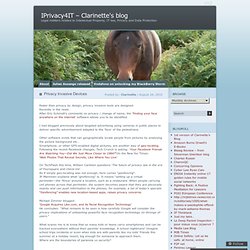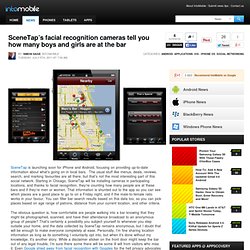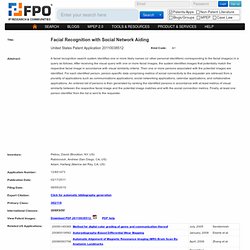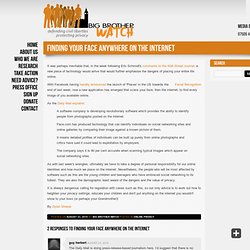

Privacy Invasive Devices. Faster than privacy by design, privacy invasive tools are designed.

Recently in the news: After Eric Schmidt’s comments on privacy / change of name, the ‘Finding your face anywhere on the internet‘ software allows you to be identified. I had blogged previously about targeted advertising using cameras in public places to deliver specific advertisement adapted to the ‘face’ of the pedestrians. Other software exists that can geographically locate people from pictures by analysing the picture background etc… Smartphone, or other GPS-enabled digital pictures, are another way of geo-locating.
Following the recent Facebook changes, Tech Crunch is asking: ‘Your Facebook Friends Are Watching You—Did We Just Move Closer to 1984? “On the New Yor Times:‘Web Photos That Reveal Secrets, Like Where You Live’ On TechFlash this time, William Carleton questions ‘The future of privacy law in the era of Foursquare and check-ins‘ As if simply geo-locating was not enough, here comes “geofencing“.
Population on. facial recognition database. FBI launch facial recognition program. Alessandro Acquisti FB face recognition. EPIC calls for moratorium. G facial recognition. FB facial recognition. Facial recognition Japan shared between shops. How to defend yourself. Google Facial recognition. iPhone face recognition. Facial recognition identifies SSN.
Face Recognition at Pizza Hut and KFC. Creepy Facial Recognition Software and Job Searching: Be Vigilant. The Future Of Advertising Is Facial Recognition. If Rana el Kaliouby has her way, you will never have to channel surf again.

Affectiva, the company that el Kaliouby founded with MIT colleague Rosalind Picard, develops technology that reads minute facial expressions to measure emotion. A television equipped with a webcam and Affectiva's technology could determine which shows you like to watch, given your past emotional reactions to them, and program your television accordingly. Affectiva's facial-reading software, Affdex, is already being used by major advertisers, including Unilever and Coca-Cola, that previously depended on focus groups and surveys to test ads. The problem with the old approach? It requires people to self-report their reactions.
Since its launch in 2011, Affdex has helped measure audience sentiments for several high-profile events, including the 2012 U.S. presidential debates and this year's Super Bowl. "Affectiva is doing something radically different with data. 8 Weird Ways People Are Using Facial Recognition Software. Once in a while, it's nice to be able to blend into the crowd, especially for those who could use a break from being constantly digitally connected.

But even away from the computer, it seems, we can't escape our digital personas (and not only when prospective employers stumble into embarrassing online photos). "People are losing control of their own information," Ginger McCall, the Open Government Counsel for the Electronic Privacy Information Center says. Security stories - Gizmodo. Face/facial Recognition.
Layar, worlds first mobile Augmented Reality browser SceneTap's cameras tell you how many boys and girls are at the bar. SceneTap is launching soon for iPhone and Android, focusing on providing up-to-date information about what’s going on in local bars.

Facial Recognition with Social Network Aiding - Patent Application 20110038512. This application claims priority to the following U.S.

Provisional Patent Applications which are incorporated by reference herein in their entirety: U.S. Provisional Patent Application No. 61/232,397, filed Aug. 7, 2009, entitled “Architecture for Responding to a Visual Query” and U.S. Provisional Patent Application No. 61/370,784, filed Aug. 4, 2010, entitled “Facial Recognition with Social Network Aiding.” This application is related to the following U.S. Provisional Patent Applications all of which are incorporated by reference herein in their entirety: U.S. The disclosed embodiments relate generally to identifying one or more persons who potentially match a face in an image query. by utilizing social network information and information obtained from other pictures of the identified person(s) to facilitate identification of the best matching person(s). According to some embodiments a server system is provided for processing a visual query including a facial image. Finding your face anywhere on the internet. It was perhaps inevitable that, in the week following Eric Schmidt's comments to the Wall Street Journal, a new piece of technology would arrive that would further emphasise the dangers of placing your entire life online.

With Facebook having handily announced the launch of 'Places' in the US towards the end of last week; now a new application has emerged that scans your face, then the internet, to find every image of you available online. As the Daily Mail explains: As with last week's wrangles, ultimately we have to take a degree of personal responsibility for our online identities and how much we place on the internet. Nevertheless, the people who will be most affected by software such as this are the young children and teenagers who have embraced social networking to its fullest.
They are also the demographic least aware of the dangers and the value of privacy. Michael Zimmer.org » Blog Archive » Google Acquires Like.com, and its Facial Recognition Technology.